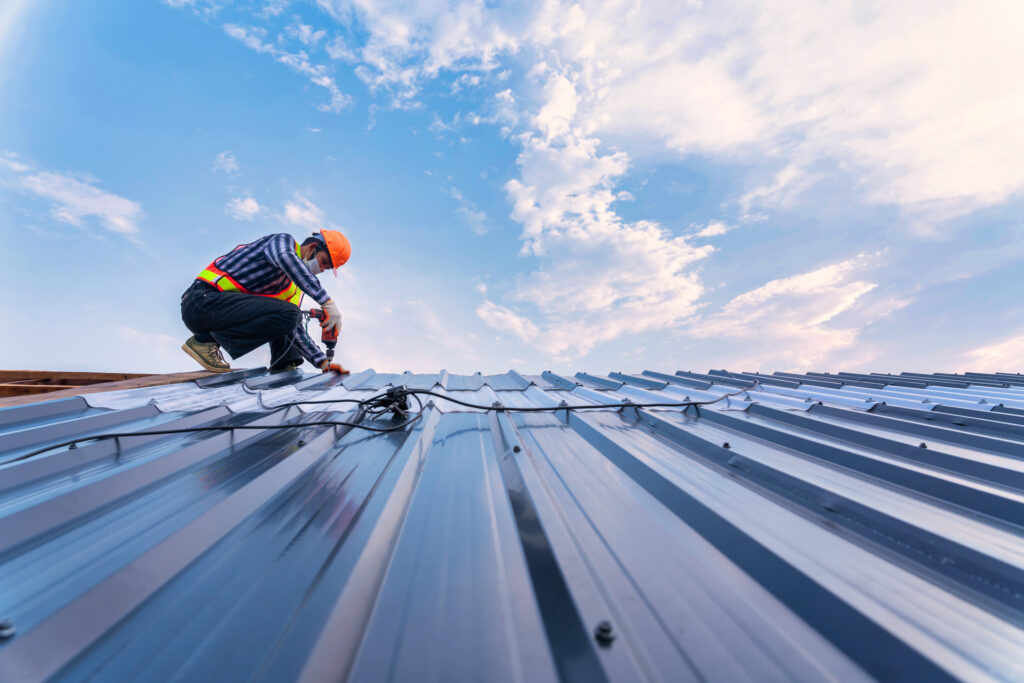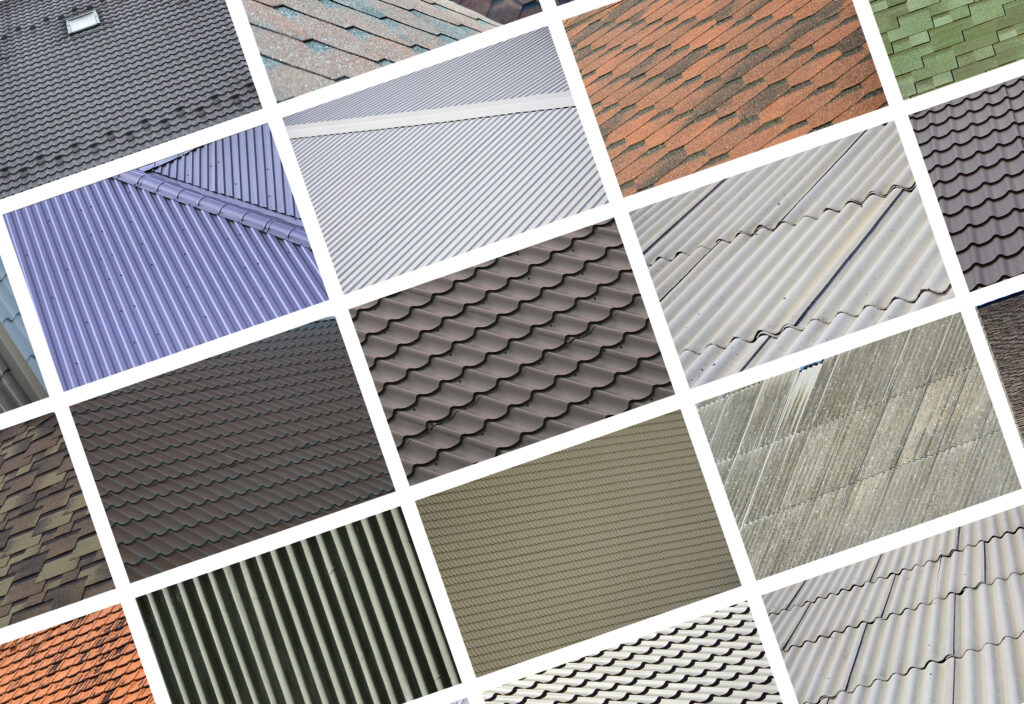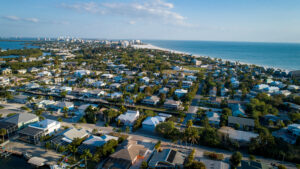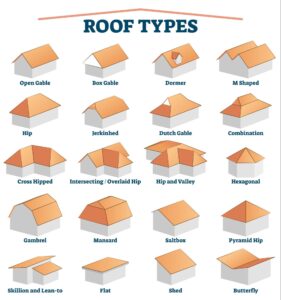While the Sunshine State offers a unique blend of natural beauty and outdoor opportunities, it also presents a challenge for homeowners regarding roofing. Florida’s climate is notorious for its high humidity, frequent hurricanes, intense sun exposure, and occasional heavy rain. These weather conditions can take a toll on your home, making it imperative that homeowners choose the best type of roof for Florida’s unique climate.
Selecting the best type of roof for your Florida home is not only an aesthetic choice—it’s a practical necessity. Your roof must withstand the elements and provide reliable protection, energy efficiency, and longevity. In this guide, we will explore the best roofing materials suited to Florida’s climate. We’ll also provide insights into other key factors to consider, as well as the pros and cons of various roofing materials and the importance of energy efficiency. First, though, it’s important to recognize the unique characteristics that define Florida’s climate.
Understanding Florida’s Climate Challenges: High Humidity, Hurricanes, and Heavy Rain
To make an informed decision about roofing materials, it’s essential to have a comprehensive understanding of the unique climate conditions that your roof must face in the Sunshine State.
Florida’s subtropical climate is characterized by its high humidity levels, especially during the sweltering summer months. This persistent moisture in the air can take a toll on roofing materials over time. High humidity provides a fertile ground for mold, mildew, and algae growth, which can not only mar the appearance of your roof but also compromise its structural integrity. Roofing materials selected for Florida must be able to withstand this humidity, resist moisture infiltration, and inhibit the growth of these microorganisms.
Florida is no stranger to hurricanes and tropical storms, particularly during the hurricane season. These weather phenomena bring powerful winds and heavy rainfall, subjecting your roof to severe stress. Roofs need to be capable of withstanding the strong winds and potential impact of debris carried by hurricanes. Additionally, heavy rain can lead to water infiltration and leaks if the roofing material and installation are not up to the task. The choice of roofing material for Florida homes must prioritize hurricane resistance and proper water shedding to ensure the roof’s durability and, more importantly, the safety and protection of your home.
Key Factors To Consider When Choosing the Best Type of Roof for Florida
Choosing the right roofing material for your Florida home goes beyond personal preferences—it’s a practical decision influenced by several factors. Below, we provide a table that details the critical considerations that will help you make an informed choice tailored to Florida’s climate.
| Determining Wind Damage to Roof Shingles | ||
|---|---|---|
| Key Considerations When Choosing the Best Type of Roof for Florida | ||
| Durability | Your roofing material must be able to withstand not only the intense heat and UV radiation but also the frequent storms, heavy rainfall, and high humidity. The choice of a durable material ensures your roof will stand the test of time. | |
| Energy Efficiency | Cool roofs and reflective materials can help reduce heat absorption, lower indoor temperatures, and ultimately cut cooling costs. An energy-efficient roof is not only environmentally friendly but can also save you money on utility bills. | |
| Hurricane Resistance | Given Florida's vulnerability to hurricanes, selecting a roofing material with high wind resistance is crucial. Look for materials that meet the state's building codes and are rated for hurricane-prone areas. Proper installation methods also play a vital role in ensuring hurricane resistance. | |
| Aesthetic Appeal | Consider the visual impact of your roofing material, as it can significantly influence your home's curb appeal. Fortunately, numerous options combine both aesthetics and functionality. | |
| Budget and Maintenance | Evaluate the cost of the materials and installation, factoring in long-term maintenance and repair expenses. Low-cost materials may be tempting, but they may not offer the durability needed for Florida's climate. | |
| Local Regulations and Building Codes | Florida has specific building codes and regulations designed to ensure the safety and structural integrity of homes, especially in hurricane-prone areas. It's essential to choose roofing materials and contractors that comply with these local standards and obtain the necessary permits. | |
| Roof Color and Heat Absorption | The color of your roofing material can impact heat absorption. Light-colored roofs reflect more sunlight and heat, which can help keep your home cooler. Dark-colored roofs absorb heat and may lead to higher cooling costs. | |
Considering these key factors in your decision-making process will lead to a roofing choice that not only enhances your home’s protection but also meets your aesthetic preferences and budget. Each factor plays a significant role in ensuring that your roofing material is well-suited to the specific demands of Florida’s climate and weather conditions.
Florida Roofing Material Options: A Concise Breakdown
Florida’s climate demands a roofing material that can handle its unique challenges. Here, we’ll explore a range of roofing material options that are well-suited to the Sunshine State, including:
Metal Roofing
Metal roofing is a top choice for Florida homeowners due to its exceptional durability and resistance to the state’s climate extremes. Made from materials like steel, aluminum, or copper, metal roofs are renowned for their longevity. They can withstand the high humidity that can lead to mold and mildew growth on other roofing materials. Additionally, metal roofs are highly resistant to hurricanes, making them a reliable choice in a state prone to tropical storms. Their reflective properties help reduce heat absorption, making them energy-efficient in Florida’s hot climate.

Asphalt Shingles
Asphalt shingles are a practical and cost-effective roofing choice for many Florida homeowners. They offer reliable performance, affordability, and versatility. They come in a wide range of styles and colors, allowing homeowners to find the right aesthetic match for their homes. However, for Florida’s challenging climate, specialized high-wind asphalt shingles should be considered. These enhanced shingles provide additional durability, making them a more suitable choice for areas prone to hurricanes and storms.
Tile Roofing
Tile roofing is favored for its aesthetics and its ability to impart a Mediterranean or Spanish style to homes. Its charm and durability make it a popular choice in Florida. Tile roofs excel in withstanding the intense heat of Florida’s sun, but they may require maintenance to prevent water infiltration through gaps between tiles.
Cool Roofs
Cool roofs are designed with energy efficiency in mind. They reflect more sunlight and absorb less heat, making them effective in reducing cooling costs. In Florida’s hot climate, cool roofs can help maintain a comfortable indoor temperature while also being environmentally friendly.
Slate Roofing
Slate roofing adds an element of elegance to homes, and it is renowned for its timeless aesthetic appeal. With a long lifespan, slate is an attractive option for homeowners looking for a durable and classic roofing choice. Its resistance to high humidity and extreme weather conditions can make it a suitable choice in Florida’s climate.
Each of these roofing materials comes with its own set of advantages and considerations, offering a variety of options for Florida homeowners. The best type of roof for Florida homes really depends on the individual but should align with your priorities, considering factors like durability, aesthetics, and energy efficiency.
The Importance of Energy Efficiency
In Florida’s tropical climate, where cooling your home is a year-round necessity, energy-efficient roofing options play a significant role in minimizing energy consumption and environmental impact.
Cool roofs, with their ability to reflect sunlight and absorb less heat, are particularly effective in Florida’s hot climate. By reducing the heat transferred into your living spaces, these roofs lower the need for excessive air conditioning, which translates into both cost savings and reduced carbon footprint. Reflective coatings, applied to various roofing materials, offer a similar advantage, enhancing solar reflectance and contributing to energy efficiency.
Additionally, proper attic and roof ventilation, often overlooked in energy efficiency discussions, helps release trapped heat, reducing the strain on your air conditioning system. And by insulating your attic and roof space, you can regulate indoor temperatures, minimize heat transfer, and reduce energy consumption. In a climate where temperatures can soar, these practices can significantly enhance your home’s energy efficiency.
Are You Ready To Begin Your Roofing Project?
In the heart of Florida’s challenging climate, selecting the right roofing material is not just a decision; it’s a strategic investment in the comfort, sustainability, and protection of your home. From the durability of metal roofs to the energy efficiency of cool roofs, you have a range of options to choose from. These choices can significantly influence your energy bills, environmental footprint, and the lifespan of your roof. By considering factors like durability, energy efficiency, hurricane resistance, aesthetics, and budget, you can make an informed decision tailored to Florida’s unique climate.
If you’re ready to take the next step in determining the best type of roof for Florida conditions and your home, we’re here to help. Gulf States Roofing and Construction is your trusted partner in providing roofing solutions tailored to Florida’s climate. Contact our team today to schedule a consultation and make your roofing project a seamless and rewarding experience. Your satisfaction and peace of mind are our priority, and we look forward to working with you to create a home that thrives in the face of Florida’s climate.






